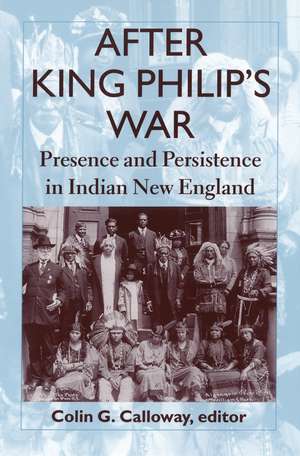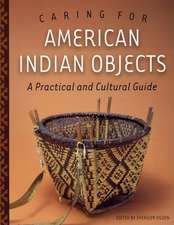After King Philip’s War: Presence and Persistence in Indian New England
Editat de Colin G. Callowayen Limba Engleză Paperback – mai 1997
The 1676 killing of Metacomet, the tribal leader dubbed "King Philip" by colonists, is commonly seen as a watershed event, marking the end of a bloody war, dissolution of Indian society in New England, and even the disappearance of Native peoples from the region. This collection challenges that assumption, showing that Indians adapted and survived, existing quietly on the fringes of Yankee society, less visible than before but nonetheless retaining a distinct identity and heritage. While confinement on tiny reservations, subjection to increasing state regulation, enforced abandonment of traditional dress and means of support, and racist policies did cause dramatic changes, Natives nonetheless managed to maintain their Indianness through customs, kinship, and community.
Preț: 183.00 lei
Nou
Puncte Express: 275
Preț estimativ în valută:
35.02€ • 38.03$ • 29.42£
35.02€ • 38.03$ • 29.42£
Carte tipărită la comandă
Livrare economică 22 aprilie-06 mai
Preluare comenzi: 021 569.72.76
Specificații
ISBN-13: 9780874518191
ISBN-10: 0874518199
Pagini: 278
Dimensiuni: 152 x 229 x 18 mm
Greutate: 0.41 kg
Ediția:1
Editura: University Press of New England
Colecția University Press of New England
ISBN-10: 0874518199
Pagini: 278
Dimensiuni: 152 x 229 x 18 mm
Greutate: 0.41 kg
Ediția:1
Editura: University Press of New England
Colecția University Press of New England
Notă biografică
Colin G. Calloway is Professor of History and Native American Studies at Dartmouth College. His many books include New Worlds for All (1997) and The American Revolution in Indian Country (1995). He has also edited North Country Captives (1992) and Dawnland Encounters (1991).
Cuprins
Introduction: Surviving the Dark Ages • Revisiting The Redeemed Captive: New Perspectives on the 1704 Attack on Deerfield • The "Disappearance" of the Abenaki in Western Maine: Political Organization and Ethnocentric Assumptions • The First Whalemen of Nantucket • The Right to a Name: The Narragansett People and Rhode Island Officials in the Revolutionary Era • "Divorced" from the Land: Resistance and Survival of Indian Women in Eighteenth-Century New England • "Once More Let Us Consider": William Apess in the Writing of New England Native American History • The Massachusetts Indian Enfranchisement Act: Ethnic Contest in Historical Context, 1849-1869 • Unseen Neighbors: Native Americans of Central Massachusetts, A People Who Had "Vanished" • Tribal Network and Migrant Labor: Mi'kmaq Indians as Seasonal Workers in Aroostook's Potato Fields, 1870-1980












